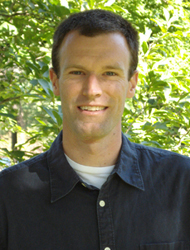
Matthew Cooper, a graduate student in the Global Linkages of Biology, Environment and Society (GLOBES) program, was recently nominated for a one-year term on the Integrative Graduate Education and Research Traineeship (IGERT) program’s trainee advisory board. He will serve as a mentor to new trainees who will be competing in the IGERT program’s annual video and poster competition. Cooper won the Community Choice Award at last year’s competition for his presentation, “Taking the pulse of Great Lakes coastal wetlands: scientists tackle an epic monitoring challenge.”
The IGERT program is the National Science Foundation’s (NSF) interdisciplinary training program that helps create new models for graduate education and training in an environment that focuses on research beyond traditional disciplinary boundaries. IGERT funding established the GLOBES program at Notre Dame in 2006, which brings together the skills of biologists, environmental and social scientists, lawyers, public policy experts, and religious and community leaders. The program trains Ph.D. scientists capable of designing and implementing sound scientific solutions to environmental problems in human and global health within the framework of human culture, economics, policy, and law.
As a member of the GLOBES program, Cooper studies the coastal wetland habitats of the Great Lakes. He helps manage a large monitoring program that is collecting baseline information on nearly 1,000 coastal wetlands along the U.S. and Canadian shorelines of the Great Lakes. The information collected on fish, invertebrates, plants, birds, and amphibians will be used to advise state, provincial, and federal agencies on how best to manage Great Lakes coastal resources. Data collected as part of the monitoring effort is also being used to answer broader ecological questions such as how organism community structure changes across broad spatial scales.